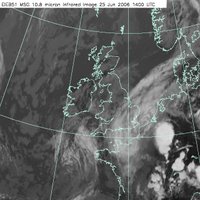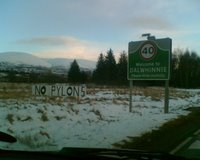Compassing Pilots and Peregrine Coasters,
 It wouldn’t have been worth recovering if today hadn’t been so glorious. The morning sky seemingly consisted of perfect blue sheets stitched together by the contrails, it really was quite magnificent and welcome after the unsettled weather the Kingdom of Fife has received of late. When I looked around the corner of my house to the north, the sky was filled with grey cloud and to the south, the sky was filled with white stratus cloud. The IR satellite picture taken in the afternoon confirms the Kingdom of Fife was resplendent under a lucky belt of cloudless sky (those thunder storms over France must have been really special).
It wouldn’t have been worth recovering if today hadn’t been so glorious. The morning sky seemingly consisted of perfect blue sheets stitched together by the contrails, it really was quite magnificent and welcome after the unsettled weather the Kingdom of Fife has received of late. When I looked around the corner of my house to the north, the sky was filled with grey cloud and to the south, the sky was filled with white stratus cloud. The IR satellite picture taken in the afternoon confirms the Kingdom of Fife was resplendent under a lucky belt of cloudless sky (those thunder storms over France must have been really special).I still didn’t feel like I could manage to do anything that required any really energy so I spent the day lying on cushions, saved from the reams of broken sun loungers, on the patio. I may have just looked like another piece of the debris – spars for fences yet to be built, cuttings yet to be dumped - in the yard, propped up against the fence, sheltering from the breeze but it was a fine, and probably the only, way to pass the day.
So I lay, reading and listening to CDs (Nada Surf’s Let Go, My Latest Novel’s Wolves and Asleep in the Back by Elbow), my peace was only intruded upon between each CD finishing and the act of starting another by my favourite neighbours, the Sectarian Bigots, swearing at each other and, later, by the piteous groans of Screech’s trampoline. I was reading, and I indeed did finish, Raw Spirit: In Search of the Perfect Dram by Iain Banks.
Iain Banks is my favourite author; he’s most famous for being the author of The Wasp Factory but I think Walking on Glass is his best book. Walking on Glass is the most imaginative, clever and rewarding book I’ve ever read – a third of the book is quite turgid but it was worth persevering with because I was clever enough to understand why it was so, I’ve known a few English teachers who weren’t. It’s not just a book that finishes after the final page; the digestion of the book is as pleasing as the reading.
Raw Spirit is Iain’s first published work of non-fiction and although, he is my favourite author, I had dismissed the book, when it was first released in 2003, because I have little interest in alcohol and even less in whisky. However, with limited choice in Methil Library, this was the book I chose and I’m glad I did. It’s not really about whisky, Iain isn’t an expert on whisky-taking, he just likes tasting whisky. What emerges most from this book is Iain Banks’ passion for
The book is filled with all sorts of anecdotes, whether they are about fitba, Drunken Urban Climbing, his friends, music, Iain’s adventures with his cars and boats,  his books (of which, it seems he’s rightly very, very proud) or his childhood, they’re always amusing, whisky really is just a broad platform on which to collect all these autobiographical tales on. I didn’t really like the political rants on the war in
his books (of which, it seems he’s rightly very, very proud) or his childhood, they’re always amusing, whisky really is just a broad platform on which to collect all these autobiographical tales on. I didn’t really like the political rants on the war in
My other criticism of Raw Spirit involves the continual use of “you” to address the reader. It’s not really Iain Banks’ fault, it’s a fault of the English language, it doesn’t have an equivalent of “on” which exists in the French language. I just don’t like it, it’s something those English teachers would warn against, I don’t even write “you” in The Bellyaches – as a result, I sometimes use “I” more than I would like and I imagine I might seem self-centred to some readers. I can’t complain about much in this book, it’s really funny and my own anecdotes can’t compare.
Dalwhinnie Distillery was the first distillery Iain Banks visited. One of the catchphrases in my catchphrase-driven life owes its existence to Dalwhinnie, although I never said the words in question at the time, everyone does a great impression of me saying the words and I can’t rid myself of this catchphrase. When my colleagues have little to do, they love nothing more than to go on a drive. Although inspired by the scenery Iain Banks described, I ’ve never been a fan of these particular drives; they lack purpose, needlessly add to the Greenhouse Effect and they’re never about what they should be about. One day I agreed to go along as a passenger, on the road, I was told the aim of the drive would be to journey up the A9 until a suitable destination was found. Road atlas in hand, I tracked our progress, “let’s just go to Dunkeld.”, “we can turn off here for Aberfeldy.”, “let’s stop at Pitlochry and head back”, “why don’t we just go to Tummel Bridge?” but still we kept driving, past every settlement within reasonable range of Fife, “we can’t keep going to Aviemore or Inverness”, and into the clouds. Eventually, we pulled up at Dalwhinnie, the highest settlement in
’ve never been a fan of these particular drives; they lack purpose, needlessly add to the Greenhouse Effect and they’re never about what they should be about. One day I agreed to go along as a passenger, on the road, I was told the aim of the drive would be to journey up the A9 until a suitable destination was found. Road atlas in hand, I tracked our progress, “let’s just go to Dunkeld.”, “we can turn off here for Aberfeldy.”, “let’s stop at Pitlochry and head back”, “why don’t we just go to Tummel Bridge?” but still we kept driving, past every settlement within reasonable range of Fife, “we can’t keep going to Aviemore or Inverness”, and into the clouds. Eventually, we pulled up at Dalwhinnie, the highest settlement in
I could tell the stories of the “You always have to ruin everything” and “Let’s go down the sunny side of the hill” catchphrases but they’re rotten in comparison to the tales of Raw Spirit. There’s loads of little bits for the reader to ponder and on many occasions, I can identify with Iain; I like maps too (it’s a pity there isn’t a map included in the book), I’m not religious but I believe in the “it’s-going-to-be-alright-good-omen feelings” and I’m fascinated by fireworks too, but someone else will identify with different parts of Iain’s persona and that’s the real charm of Raw Spirit.

0 Comments:
Post a Comment
<< Home